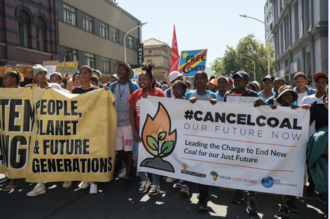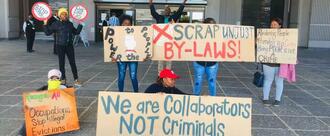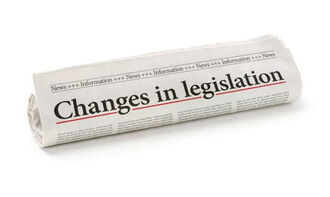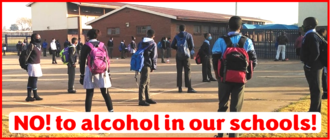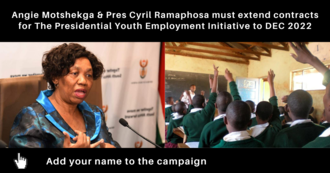- Featured
- Clean air
- Climate justice
- Consumer Rights
- Corporate Accountability
- Data access
- Early Childhood Development
- Economic fairness
- Education
- Electoral fairness
- Environmental justice
- Food justice
- Gender based violence
- Grants/social assistance
- Health
- Housing and infrastructure
- Industry interference
- Land Justice
- LGBTQIA+ rights
- Media/ information access
- Public transport
- Racism
- Reparations
- Safety
- Sanitation
- Service Delivery
- Sexual and Reproductive Rights
- Social justice
- Unemployment
- Womxn's rights/ gender equality
- Workers' rights
- More
-
Treasury did big sugar businesses influence your decision?On the 1st of April, the day the HPL increase was to start, Treasury issued a statement postponing the increase [1]. Treasury did not justify this last-second decision, which has raised concerns about what evidence was used to make this decision. Did Treasury choose to put profits before health by agreeing to the demands of the sugar industry? The sugar industry has a conflict of interest when it comes to the sugary drinks tax. That's why it is important Treasury reassure the public that the sugar industry did not influence their decision. The sugar industry has used its power and resources to attack the sugary drinks tax [2]. HEALA has called on Treasury to provide the research and information that was used to make the decision to delay the HPL increase by a year. HEALA has also called on Treasury to confirm whether they engaged with the sugar industry and its associates. If so, in the interest of transparency, Treasury must share meeting minutes and records of engagements and communication with industry. But Treasury has refused to respond to HEALA. The organisation had to resort to submitting a Public Access to Information Act (PAIA) application, but the deadline to respond has come and gone. But if enough of us come together, we can turn up the public pressure on Treasury to be transparent and accountable when it comes to decision-making processes which greatly impact the health of millions of people in South Africa. [1] Media Statement: Release of Revised Draft Rates and Monetary Amounts and Amendment of Revenue Laws Bill. National Treasury. 1 April 2022. [2] Well-conceived sugar tax needs further strengthening to save lives of millions. By Mikateko Mafuyeka and Petronell Kruger for Daily Maverick. 22 September 2022.48 of 100 SignaturesCreated by HEALA

-
Stop closed door meetings between government and big businesshttps://youtu.be/nuVHJT_rhgI Imagine your teacher smoking in the classroom. For some of us, this was the reality until new rules were put in place by government in 1993 [6]. But why had government not acted sooner? In their paper published in 2003, Mia Malan and Rosemary Leaver outline the relationship between the biggest tobacco business and government [7] [8]. Government eventually put public health before profits, thanks to the work of health advocates. But big businesses are still using their power to protect their profits at our expense. Researchers have pointed out that big businesses have worked to delay and delegitimize important health policies by using their associations and different strategies [9]. Researchers and civil society groups are not allowed to attend a standing meeting between the National Department of Health and big food businesses [9]. State capture has shown us we have a lot of work to do. But we are making some progress in improving transparency and accountability. Politicians have to declare financial interests [10], and political parties now must disclose who funds them [11]. We need to keep building on this momentum. We can't afford to have a repeat of 2014 where big businesses that make food like polony did not agree with government's proposed hygiene rules and instead wanted to self-regulate [12] [13]. Government should have stood up to those big businesses in 2014 and put the new rules in place anyway. Government has to stand up to big business bullies. Their job is to serve the people, not private interests. References can be found here: https://amandla.mobi/big-business-bullies-references8,399 of 9,000 SignaturesCreated by amandla mobi member

-
We need unhealthy food warning labels so we know which foods threaten our healthShops across South Africa are filled with pre-packaged foods that are processed with high levels of added sugars, salt, and saturated fats. A diet high in sugar, sodium or saturated fat can increase the risk of developing life threatening diseases such as diabetes, heart disease and some cancers. Easy to read food front-of-package warning labels can help consumers quickly, easily, and correctly identify foods high in nutrients of concern, such as excess salt, fat and sugar. The good news is the Department of Health is considering warning labels, and could start the process of implementing them by opening public comment. But already big food companies are trying to lobby against these warning labels [1]. But if enough of us come together, we can help ensure the department puts our health first, not corporate profits. We believe that we, not the food and drinks industry, have the right to decide what we are willing to put in our bodies. The people of South African deserve to know what is in our food. References: [1] https://www.dailymaverick.co.za/article/2022-05-30-heres-why-you-should-care-about-the-food-industry-lobbying-the-health-department-behind-closed-doors/1,074 of 2,000 SignaturesCreated by HEALA

-
Angie Motshekga must expand + extend contracts for The Presidential Youth Employment InitiativeThis contract extension will help thousands of youth and their families struggling as it is to make ends meet. Some employees have started going to school and pursuing Education due to the opportunity that was given by the Basic Education programme. Some families depend on us, and some of us have children. This programme has made a massive difference in our lives. Please extend our contracts Mama Angie. Youth unemployment rate in South Africa has increased to 64.4% in the second quarter of 2021 from 63.3% in the first quarter of 2021 [1]. [1] South Africa Youth Unemployment Rate: https://tradingeconomics.com/south-africa/youth-unemployment-rate40 of 100 SignaturesCreated by Ntuthuko Msimango
-
We call on the MJC to not isolate and discriminate against Queer MuslimsWe strive to create Muslim spaces in South Africa that are safe, affirming and supporting to LGBTQ Muslims. We exist, we strive to achieve our full freedom and live with our dignity intact. As Muslims who believe in the oneness, the Beneficent and Merciful. All people deserve to enjoy a life free from oppression and discrimination. Together we can dismantle oppressive institutions and build safe, affirming and kind spaces for LGBTQIA+ Muslims and all persons. [1] https://www.iol.co.za/news/south-africa/muslim-judicial-council-issues-short-fatwa-against-gays-70bdab57-583c-4978-9ca8-891cc0bc9476158 of 200 SignaturesCreated by Sarah Mahomed
-
Fix R350 grant problems now Mr PresidentThe R350 SRD grant was mainly introduced to provide relief to the unemployed during the first lockdown in 2020 when the Covid-19 pandemic hit. The need for the grant further highlighted the urgent need for the long-overdue BIG which was recommended by the Taylor Committee Report nearly 20 years ago [3]. Unless the problems of the grant are urgently attended to and fixed, they will continue to hinder the progress of implementing the BIG by April 2023. President Cyril Ramaphosa must honour his commitment to leave no one behind and ensure that Treasury, DSD and Sassa work together to fix all R350 issues before it ends in March 2023 and then have it turned into the much-needed Basic Income Grant. [1] https://www.gov.za/speeches/president-cyril-ramaphosa-2022-state-nation-address-10-feb-2022-0000 [2] https://www.groundup.org.za/article/seven-million-people-have-applied-for-r350-grant-since-saturday/ [3] https://ewn.co.za/2022/02/09/a-basic-income-grant-the-nitty-gritty-and-feasibility-of-this-proposed-idea601 of 800 SignaturesCreated by Lerato Maphoto
-
[VICTORY]Tell the Government to End New Coal and Invest in Renewable Energy for a Brighter Future• Building new coal plants will take years and be very expensive to build and maintain. This will drive up the cost of electricity for everyone even more. • Renewable energy projects are cheaper, more sustainable and can be deployed quickly to meet our immediate electricity needs, while bringing electricity to communities who most need it. • Those who live on the coal front are already suffering extreme health problems because of poor air quality around coal plants. Air pollution from coal-fired power stations kills more than 2,200 South Africans every year and causes thousands of cases of bronchitis and asthma in adults and children annually. • People who work coal jobs are increasingly under threat of retrenchments and are also forced to work in very unhealthy environments. Future renewable energy and other green economy jobs can create even more opportunities for workers than future coal jobs – if planned carefully. • Coal is a major contributor to climate change, driving extreme weather events that threaten our way of life. We have a responsibility to current and future generations to reduce emissions and embrace sustainable energy solutions. Sign on to Tell the Government to End New Coal for our Just Future ! About the Campaign! The #CancelCoal campaign is a youth-led campaign by the African Climate Alliance, Vukani Environmental Movement, and groundWork. It calls for the end of new coal in South Africa and supports the landmark legal case of the same name, represented by the Centre for Environmental Rights. The legal case is a constitutional challenge to the South African government’s plans to introduce 1500 MW of new coal-fired power electricity - the equivalent of three to four large power plants. We are asking the court to put a stop to the government’s call for the development of this new coal capacity.858 of 1,000 SignaturesCreated by ACA Team
-
WE DEMAND THE CITY OF CAPE TOWN WITHDRAW THE UNCONSTITUTIONAL UNLAWFUL OCCUPATION BY-LAWThe unlawful occupation by-law, gazetted on the 14th of February 2022 undermines the constitution and circumvents the PIE ACT. This by-law deviates from the Human Settlements Strategy which provides that the City should “proactively plan for informality.” The Unlawful Occupation By-law contradicts this aim, it seeks to criminalise poor and working-class people who have fallen through the cracks of the city’s housing waiting list. The City’s by-law on unlawful land occupation seeks to bypass the protections of PIE. It also provides the so-called “City officials” with large amounts of arbitrary and discretionary power over poor and working-class people.271 of 300 SignaturesCreated by Aphiwe Ngalo
-
Have Your Say: Tell DSD to withdraw the Draft NPO Amendment Bill!The proposed changes are not-fit-for-purpose. If implemented in its current form, it will create more onerous rules for NPOs and fail to improve the capacity of DSD to fulfil its mandate. Such compliance changes on NPOs could result in deregistration or undue delays for organisations, mainly if they provide services to the state. The current administrative delays already create significant challenges, and the new Bill may worsen, rather than reduce, these. The Department’s NPO Directorate reiterated that it was important that the sector at large submit comments on the Bill. Public comments will shape and change the Bill - this is why your signature is needed. Key areas of concern: 1. A poorly drafted Bill: The Bill is poorly drafted, open to interpretation and lacks precise alignment between DSD’s stated intentions and the actual amendments. 2. The NPO directorate name changed, to a Registrar. There is a lack of clarity about whether that Registrar will be independent and move out of the DSD; concerns about capacity and resources remain. 3. Accountability of the NPO sector: There is a lack knowledge about and implementation of good governance at many NPOs. A new structure for boards has been proposed, which includes deputies. The sector agrees that governance is an issue, and there is a need for self-regulation, but not in the way it has been formulated in the Bill. 4. Cleaning up the NPO database: At present many NPOs are registered with identical names. There is also a campaign to deregister those NPOs which do not meet legislative requirements. However, there are concerns that the DSD lacks the capacity to address the database issues and the form this will take in terms of the Bill proposals. 5. Registration of international NPOs. The DSD has shared that this provision has been included in the Bill because of information received from a government investigative team that some NPOs could be caught up in money laundering and finance for terrorist activities. While there is agreement on the need to counter corruption and terrorism, there are concerns the sector will be over-regulated with draconian controls. Sign and Comment on our letter of Request to the Department of Social Development Parliamentary Portfolio Committee and the Non-Profit Directorate to recall the Non-Profit Amendment Bill (originally 31 October 2021, now 10 June 2022) and write your letter to Chief Director: NPO Information and Registration Management, Mpho Mngxitama email: [email protected] For further reading For more details on these communiques, see https://www.inyathelo.org.za/important-information.html Communiqué 1: 28 October 2021 Inyathelo webinar convened on 21October 2021 on the DSD’s call for comments on the Non-Profit Amendment Bill 2021. Communiqué 2: 3 November 2021 The Working Group on the Nonprofit Organisation Amendment Bill (WG-NOAB) submitted a letter requesting an extension to the deadline for comments on the NPO Amendment Bill, along with preliminary comments on the Bill to the Acting Director-General, Mr Mchunu, on 31 October 2021. Communiqué 3: 9 November 2021 Further communication with the DSD. Agenda received for a meeting scheduled for 10 November 2021. Communiqué 4: 16 November 2021 Comments and resolutions from the meeting of 10 November 2021, called by the DSD to address the concerns raised by the Working Group regarding the NPO Amendment Bill and a request for a deadline for comments by civil society organisations. Communiqué 5: 3 March 2022 On 27 January 2022, the Working Group emailed Chief Director: NPO Information and Registration Management, Mpho Mngxitama, to query the outcome of the Cabinet’s decision on the request for an extension to the date for submissions on the NPO Amendment Bill. Communiqué 6: 11 March 2022 Virtual meeting with the NPO sector on 10 March 2022 with feedback on the NPO Act Amendment process. Communiqué 7: 23 March 2022 Subsequent to the last communication wherein nominations were requested to attend the meeting proposed by DSD and planned for 23 March 2022, the DSD advised that this meeting would only be convened virtually. Communiqué 8: 25 March 2022 The NPO representative Working Group and nominees from the NPO sector participated in a virtual meeting organised by the DSD on 23 March to discuss the NPO Amendment Bill. Although the original intention of the meeting was a workshop format, the DSD conducted the meeting as a structured presentation with question-and-answer slots at the end of each presentation. Communiqué 9: 06 April 2022 It was advised that the NPO Working Group would host a workshop on 13 April, that would help the NPO sector make submissions on the NPO Act Amendment Bill, 2021. The Working Group would also present its views on the next steps.584 of 600 SignaturesCreated by Palesa Ramolefo

-
Minister Motshekga, keep South African schools as alcohol-free zones!!This is an issue that affects everyone in our society - learners, educators, school admin staff, and anyone who has, or will have, a child in the school system. There is a saying that 'it takes a village to raise a child'. Well, it takes a caring society to protect its children from exposure to the risk of harm. Alcohol use is already a major problem in our country. Schools in some communities already face the challenge of having large numbers of liquor outlets around them and very close to them. Some already have problems with alcohol being used on their premises. Making it possible for schools to have liquor for the purpose of fund-raising simply increases the risks for all of those at schools - learners, educators, admin staff, and even family members who interact with the school. If schools have a problem raising funds, government and society must work with them to address it in other ways - allowing schools to raise money through liquor is not the answer. We should be better than that as a society, as South Africans. We call on you to join us in urging the government to scrap the sections in the BELA Bill which will allow liquor on school premises and at school events. Support the call for a complete ban on liquor on school premises (except for personal use by staff who live on school property). Demand better funding models for our schools so that all children have access to quality education in a safe and protected environment. Fly a blue ribbon at your school in support of the campaign; wear blue ribbons as a group as you participate in school activities. Write to the Minister at [email protected] to tell her what you think of the alcohol clauses in the BELA Bill. Write to the Portfolio Committee in Parliament by 15 June to register your opposition to the alcohol clauses in the Bill - Mr Llewellyn Brown, the Committee Secretary via email: [email protected] or online at https://forms.gle/MoC6AdbdQyYPk3Y49 or via WhatsApp: +27 60 550 9848. Mr Llewellyn Brown can be reached on 083 709 8450 for enquiries. Download the BELA Bill from https://www.parliament.gov.za/storage/app/media/Bills/2022/B2_2022_Basic_Education_Laws_Amendment_Bill/B2_2022_Basic_Education_Laws_Amendment_Bill.pdf Together we can win this one!6,192 of 7,000 SignaturesCreated by Southern African Alcohol Policy Alliance in SA (SAAPA SA)

-
Minister Patel - reject the EU & US ‘bad deal’ - this deal does not save lives!After 17.5 months of dragging their feet, negotiations are currently underway to reach a quick ‘deal’ at the World Trade Organisation (WTO) on the TRIPS WAIVER proposal - boldly led by South Africa and India since October 2020. MInister Patel is in charge of the negotiations for South Africa. The leaked text of the proposed ‘deal’ shows they are not negotiating a waiver, as originally requested, but rather, conditions and clarifications, which after this much time and deaths, represents a poor compromise. It will be a shame if Minister Patel supports the bad deal contained in the leaked text. He should not. The leaked text represents the interests of the EU and the US and other vested interests. It is a very bad ‘deal’ that does almost nothing to advance the demand for equitable access to vaccines (and other health products) for the majority of the world’s population - and yet the poorest and most marginalised everywhere have suffered the worst effects of the pandemic. The South African Government should REJECT this deal which is related to the ongoing TRIPS Waiver negotiations for fairer access to COVID-19 technologies for everyone, everywhere. We call on organisations and individuals in South Africa to sign onto an ‘Open Letter’ to Minister Patel and the South African Government. You can read and sign the letter here: https://forms.gle/GTT9kmf9nECFfSF86 For more information on the leaked text and reactions to it, please see: https://healthjusticeinitiative.org.za/2022/03/24/trips-waiver-negotiations-leaked-text/148 of 200 SignaturesCreated by Health Justice Initiative and African Alliance

-
Angie Motshekga must extend contracts for The Presidential Youth Employment Initiative to DEC 2022This contract extension will help thousands of youth and their families struggling as it is to make ends meet. Some employees have started going to school and pursuing Education due to the opportunity that was given by the Basic Education programme. Some families depend on us, and some of us have children. This programme has made a massive difference in our lives. Please extend our contracts Mama Angie. Youth unemployment rate in South Africa has increased to 64.4% in the second quarter of 2021 from 63.3% in the first quarter of 2021 [2]. [1] DBE embarks on the monitoring of the Presidential Youth Employment Initiative:https://www.education.gov.za/PYEIMonitoring1121.aspx [2] South Africa Youth Unemployment Rate: https://tradingeconomics.com/south-africa/youth-unemployment-rate41,167 of 45,000 Signatures
.png)
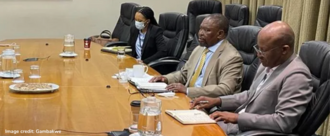


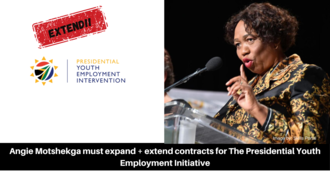
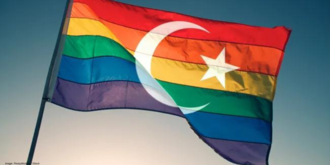
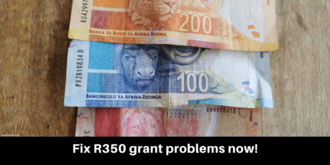.png)
